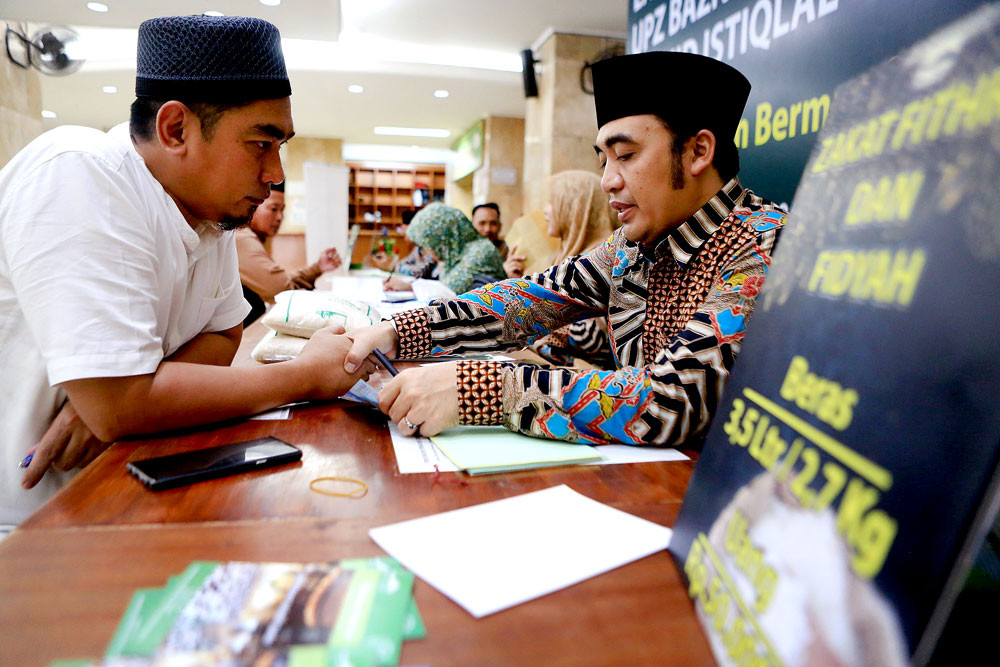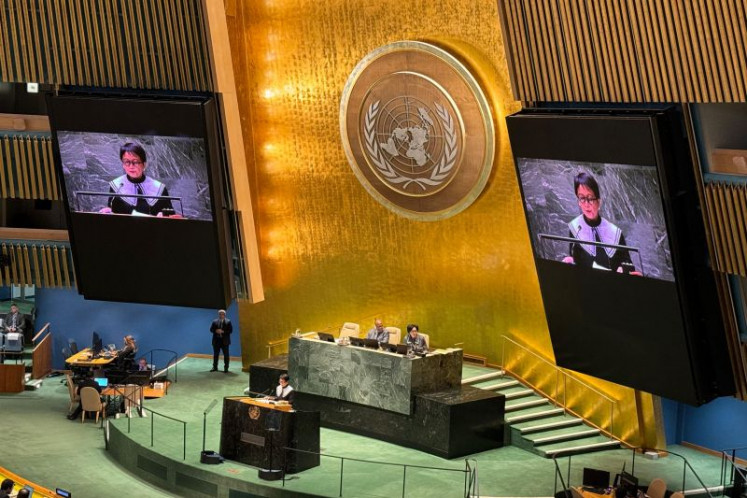Digital donations - new potential to accelerate philanthropy
Those active in the digital donation ecosystem will need to ensure their credibility and transparency in fundraising and ensure that donations are allocated correctly to those in need in order to build and maintain trust amongst the public
Change Size
 Paying donation: 'Zakat' (alms) commitee member serves a man paying alms at istiqlal mosque in Jakarta. (The Jakarta Post/Seto Wardhana)
Paying donation: 'Zakat' (alms) commitee member serves a man paying alms at istiqlal mosque in Jakarta. (The Jakarta Post/Seto Wardhana)
T
he COVID-19 pandemic has disrupted 10 years of progress made towards eradicating poverty, increasing health standards, and improving access to education. At the same time however, philanthropy and digital donations have become increasingly important in addressing pressing needs and contributing to the achievement of the United Nations’ Sustainable Development Goals (SDGs).
During the COVID-19 pandemic, many Indonesians have been expressing their generosity and supporting each other. The 2018 World Giving Index has acknowledged Indonesians as among the most generous countries in the world. With lockdowns and physical distancing restrictions in place during the pandemic, many have chosen to make their donations via online platforms to show their support and solidarity.
To understand trends in digital donations during the COVID-19 pandemic, Kopernik and GoPay collaborated on research with 1,319 respondents across 29 Indonesian provinces. The research, which is the first comprehensive research to map the digital donation ecosystem in Indonesia, shows that overall donations, both conventional and digital, increased in value by 20 percent during the pandemic, while the average value per digital donation increased by 72 percent during the same period.
The research found that millennials (age 24-39 years old) as the most frequent donors among the surveyed population, making 1.5 donations on average per month, while Gen-X (age 40-55 years old) made donations with the highest monetary value. During the pandemic, health and social issues became increasingly popular causes for people to contribute to, accounting for 27 percent and 28 percent of total donations respectively.
The pandemic has shed light on the potential of digital donations to mobilize people, particularly the younger generations who tend to be more tech-savvy, to take part in collaborative actions to support urgent needs. Unlike conventional donations, digital fundraising initiatives which typically spread through social media can reach a much larger audience transcending geographic and time boundaries to raise funds quickly for emergency needs.
With technological advancements, people can easily make donations using mobile apps and digital donation platforms from wherever they are, without the hassle of going out. People also have the freedom to choose their preferred donation amount when using digital payment systems.
The key players in the digital donation ecosystem recognize the growing trend of online donations. Nongovernmental organizations (NGOs), one of the key stakeholders benefiting from these developments, have been shifting their strategies to incorporate digital donations as a key source of their funding. Kitabisa - one of the top digital donation platforms reported a 25-fold increase in the number of NGO fundraising campaigns over the past four years. The NGOs we spoke with reported that setting up online donation campaigns and promoting them through social media has been relatively easy and impactful, especially for emergency responses.
Religious institutions managing zakat (Islamic charitable contributions) for decades, such as Amil Zakat Institutions (LAZ), reported that the value of digital donations received, has been doubling each year, for the past five years. In Indonesia. According to the Outlook Zakat Indonesia 2020, the total potential value of zakat donations from Indonesia’s Muslim citizens has been calculated at Rp 233 trillion (US$16.6 billion), while the current amount of zakat donations is estimated to be around Rp 8 trillion or 3.4 percent of the total potential. This indicates a big opportunity for digital donations to support religious institutions to make it easier for people to donate by digitizing their zakat collections.
Public figures and influencers, with significant numbers of online supporters, also show an increasing interest in setting up campaigns on crowdfunding platforms and mobilizing their followers to support a range of causes. Collaborations between crowdfunding platforms and influencers and public figures could be a strategic opportunity to increase online donations for worthwhile campaigns.
The Indonesian government has also acknowledged the contribution of digital donations in boosting collaborative efforts to support charities. To support the growth of the online donation sector, the government plans to regulate the digital donations ecosystem to improve its credibility and transparency in order to gain people’s trust when making contributions.
Despite the growing trend of digital donations, the research found that 24 percent of respondents are still reluctant to make a digital donation. The main reasons stated were a lack of knowledge about digital donation platforms and a lack of transparency on how the donation will be used. However, most respondents stated that they would be willing to make a digital donation if they knew where the money would be allocated.
As digital donations become more common in gathering collective support among society, those active in the digital donation ecosystem will need to ensure their credibility and transparency in fundraising and ensure that donations are allocated correctly to those in need in order to build and maintain trust amongst the public. For crowdfunding platforms, improving user experience and adding more features such as auto-debit to support recurring donations could help in growing the donor-base.
In the context of the COVID-19 pandemic, digital donations could play an important role in contributing to Indonesia's recovery from the pandemic and get back on track to achieving sustainable development.
***
Oscar Casalderrey and Kevin Prathama are respectively the senior director and associate manager of Last Mile Consulting at Kopernik, a research and development (R&D) lab for social and environmental challenges.








